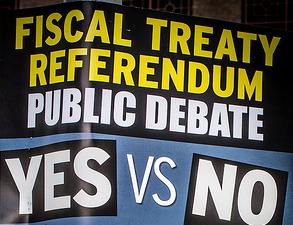Game on: this referendum could still go either way

On Tonight with Vincent Browne, Minister for Jobs, Enterprise and Innovation Richard Bruton, Sinn Féin TD Pearse Doherty, Danish MEP Morten Messerschmidt and Patricia Callan of the Small Firms Association discuss the Irish Independent's poll on the fiscal treaty and the latest on the euro zone crisis. Below, Vincent blogs ahead of the show.
We'll be curating #vinb tweets below and Vincent will respond after the show. Refresh the page for updates.
The poll in tomorrow’s Irish Independent shows 37 per cent will approval the Fiscal Treaty in the referendum in two weeks' time, while 24 per cent will oppose and 35 per cent have not yet decided. It suggests “game on”, rather than, as stated by RTÉ tonight and the Irish Independent itself, “The referendum is there for the taking by the Yes side – unless there is a significant swing of undecided voters to the No camp.”
Polls so far have suggested a large segment of the electorate is volatile and that the No side can yet win, if it advances convincing assurances to that volatile segment that voting No will not bring ruination, should Ireland need another bailout.
The Libertas (Declan Ganley) line may probe the most convincing: that a No vote would give backbone to the government in negotiating a write-down of the bank debt, leaving the way open to a second referendum on the fiscal treaty if that became a requirement to access funding from the new European Stability Mechanism (ESM) fund.
Meanwhile there are considerable doubts about the legality of the ESM initiative – article 3 of the Treaty on the Functioning of the European Union states clearly: “1. The Union shall have exclusive competence in the following areas: (a) customs union; (b) the establishing of the competition rules necessary for the functioning of the internal market; (c) monetary policy for the Member States whose currency is the euro; (d) the conservation of marine biological resources under the common fisheries policy; (e) common commercial policy.”
The extension of competence to another non-EU agency, such as the ESM, seems like a fundamental amendment to the Treaty on the Functioning of the European Union. This has two significances: (i) the procedure whereby the European Council amended the treaty – the simplified route – may not have been legal in terms of EU law, given that the “ordinary" (and more cumbersome) procedure would seem the more appropriate for a fundamental change; and (ii) a fundamental change to the EU treaties may well require a separate referendum here in Ireland.
Image top: infomatique
{jathumbnailoff}
